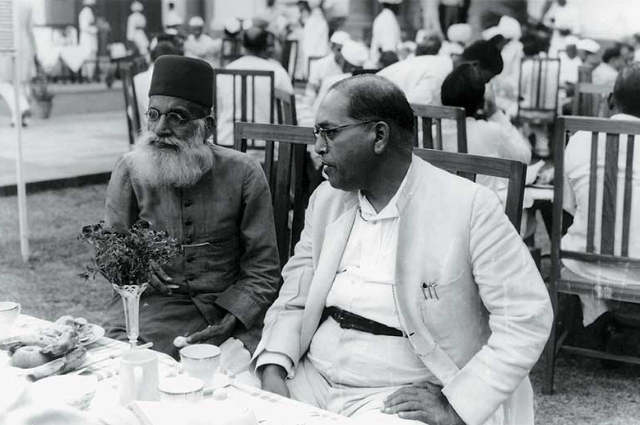Currently, Indian Muslims are vilified and their patriotism is questioned. Communal forces attempt to rewrite history while purposefully omitting Muslims. Through social media, misleading information about Indian Muslims is propagated in an anti-Muslim manner. Muslim sacrifices during the cause for Indian independence are purposefully concealed.
But even a cursory look at history would show that Indian Muslims not only played a significant role in the liberation struggle but also gave their lives in the service of the anti-colonial national cause.
The names of 95300 independence fighters are inscribed on India Gate in Delhi, and 61945 of those names are Muslim, meaning that 65% of the freedom fighters were Muslims.
Here is one such underrated Muslim Freedom Fighter: Maulana Hasrat Mohani
Hasrat Mohani, a leading figure in the Congress and a well-known poet, was the first activist to call for total independence (Poorna Swaraj) from the British in 1930 at an All-India Congress Forum. Maghfoor Ahmad Ajazi backed Hasrat Mohani's call for "Poorna Swaraj."
Inquilab Zindabad, a catchphrase widely used by freedom fighters, is credited to him. The nation will always remember this phrase as being associated with Bhagat Singh.
Maulana was also crucial in giving Urdu Ghazal a new stature. His poetry exhibits ideas about politics, society, and freedom.
However, his most popular work remains the ghazal Chupke Chupke Raat Din, that was immortalized by singer Ghulam Ali.
"Chupke chupke raat din aañsū bahānā yaad hai
ham ko ab tak āshiqī kā vo zamānā yaad hai
bā-hazārāñ iztirāb o sad-hazārāñ ishtiyāq
tujh se vo pahle-pahal dil kā lagānā yaad hai
baar baar uThnā usī jānib nigāh-e-shauq kā
aur tirā ġhurfe se vo āñkheñ laḌānā yaad hai
tujh se kuchh milte hi vo bebaak ho jaana mera
aur tira daanton mein vo ungli dabaana yaad hai
kheench lena vo mera parde ka kona dafatan
aur dupatte se tera vo muh chhupana yaad hai
jaan kar sotā tujhe vo qasd-e-pā-bosī mirā
aur tirā Thukrā ke sar vo muskurānā yaad hai
tujh ko jab tanhā kabhī paanā to az-rāh-e-lihāz
hāl-e-dil bātoñ hī bātoñ meñ jatānā yaad hai
jab sivā mere tumhārā koī dīvāna na thā
sach kaho kuchh tum ko bhī vo kār-ḳhānā yaad hai
ġhair kī nazroñ se bach kar sab kī marzī ke ḳhilāf
vo tirā chorī-chhupe rātoñ ko aanā yaad hai
aa gayā gar vasl kī shab bhī kahīñ zikr-e-firāq
vo tirā ro ro ke mujh ko bhī rulānā yaad hai
dopahar kī dhuup meñ mere bulāne ke liye
vo tirā koThe pe nañge paañv aanā yaad hai
aaj tak nazroñ meñ hai vo sohbat-e-rāz-o-niyāz
apnā jaanā yaad hai terā bulānā yaad hai
mīThī mīThī chheḌ kar bāteñ nirālī pyaar kī
zikr dushman kā vo bātoñ meñ uḌānā yaad hai
dekhnā mujh ko jo bargashta to sau sau naaz see
jab manā lenā to phir ḳhud ruuTh jaanā yaad hai
chorī chorī ham se tum aa kar mile the jis jagah
muddateñ guzrīñ par ab tak vo Thikānā yaad hai
shauq meñ mehñdī ke vo be-dast-o-pā honā tirā
aur mirā vo chheḌnā vo gudgudānā yaad hai
bāvajūd-e-iddi.ā-e-ittiqā 'hasrat' mujhe
aaj tak ahd-e-havas kā vo fasānā yaad hai"
As a versatile poet, Hasrat Mohani penned many remarkable pieces of poetry, including many of which he devoted to Lord Krishna. He was a great freedom fighter whose name, however, remains marginalised in the Indian national movement and absent from popular Indian consciousness.
Parhiye is ke siwa na koi sabaq,
khidmat-i-khalq-o-ishq-i-hazrat-i-haq
(Take to your heart no lesson but one:
Serve all life, and love Truth)
- Hasrat Mohani
Hasrat Mohani’s commitment to constitution-making:
Mohani was chosen for the Constituent Assembly from the United Provinces in a Muslim League. After the segment, he was one of the 28 individuals from the Muslim Association who stayed in India and went to the gatherings of the Constituent Assembly. In the Get-together, he mediated in various discussions remembering federalism, the Preamble (Preface of the Constitution), reservations for religious minorities, and nullification of the Zamindari framework.
Till his dying breath, Maulana Hasrat Mohani gave his life in sacrifice for the nation. Hasrat Mohani passed away in Lucknow on May 13, 1951.

